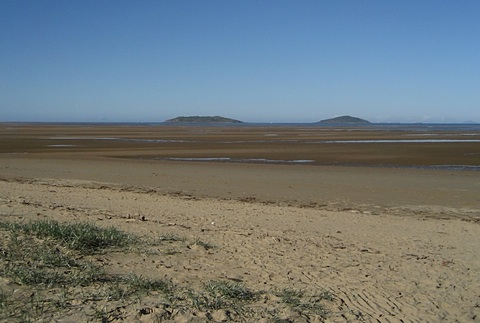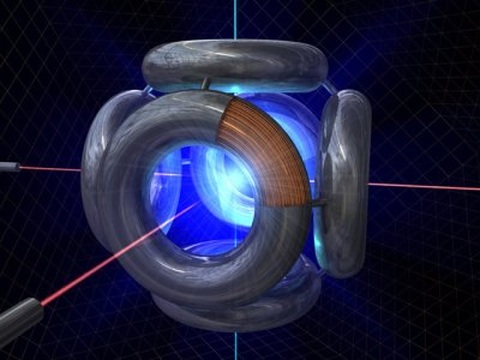The Final Drought:
by Michael J. Vandeman on 9 August 2008 in http://culturechange.org
[culturechange.org editor's note: Mike Vandeman thinks outside the box. When he advocated boycotting petroleum back in 1989 I was shocked. Soon I took up the same call. His activism in recent years has been about creating wildlife sanctuaries without human presence. He spent the previous eight years fighting automobile dependence and road construction.]
I don't understand how humans can be so intelligent, and at the same time, so stupid! A Berkeley, California-based electrical engineer, Robert Godes, claims to have a way of doing cold fusion (turning hydrogen into helium, while releasing energy), in his kitchen. If true, and I have no reason to doubt him, this could revolutionize the world's energy situation. He says he has hired a high-powered Palo Alto patent firm and is starting up a company to profit from his
idea. I wonder if he told his partners the truth about this process?
There are a few obvious problems with it. Can you think of even one profit-making company that has provided a net benefit to the world? I can't! For example, Ben and Jerry's does some good things, but basically, they make junk food -- food that no one should eat! Chevron is destroying wildlife and human habitat in the Amazon and elsewhere. In short, greed begets grief!
Can you imagine Albert Einstein taking this route (patenting his nuclear information and creating a private company to implement it)? I think that he wanted it to be used for good. He had a lot of humanity. Or take Gandhi. He taught everyone how to make their own salt, rather than creating a company to profit from his ideas. If Godes's idea is this valuable, it should be implemented in the form of a not-for-profit corporation, with a lot of input from scientists,
government (including the United Nations), and the community.
Can you wear more than one pair of pants at a time? What for? Can you eat more than one meal at a time? What for? We all have approximately the same requirements, and excess is counterproductive. Wildlife don't have that problem. An animal that killed more prey than it needed would be weeded out by evolution, because it would require more energy to accomplish the same thing: greed begets grief.
What is more important than the continuation of life on the Earth? Nothing. And it is in peril! A quarter of all species of animals are headed for extinction, and similar percentages for other species. Everything we value depends on the existence and welfare of other species [see author's website, link below]. If we don't contribute to solving that problem, what is the point? A profit-making corporation cannot do that. We already know that such corporations take the
path of least resistance toward the maximum quick returns. That's what stockholders ensure.
I think that we should make sure that our work benefits wildlife first and foremost, and then people. (Humans are 100 percent dependent on the existence and welfare of other species!) I think that that can only be done via a not-for-profit corporation or organization (e.g. a university, although they aren't focused enough on ethics). We also need to ensure that we immediately stop burning fossil fuels, not simply add a new source of energy. And we need to stop corporations
from destroying wildlife habitat. That will require the cooperation of governments, including the United Nations. A for-profit corporation can't or won't do that.
This project is moving too fast, and in exactly the wrong direction! This is not Godes's area of expertise, so I suggested that he get some better advisors, including experts on wildlife conservation (e.g. Nature Conservancy), sustainability (e.g. Amory Lovins), and environmental protection (e.g. NRDC),
and include some politicians who know how to accomplish such things.
But there are actually at least two even bigger problems. First, this process consumes water – not in the sense that an ordinary power plant consumes water, by heating it and causing it to evaporate into the atmosphere, but by permanently destroying it! It takes a molecule of pure (drinking) water, combines the two hydrogen atoms to form helium, and releases the oxygen and helium to the atmosphere. The water molecule is gone forever!
Water is the basis for all life. Without water, life could not exist on the Earth. In California, all water is already spoken for, by wildlife, agriculture, and people. There is no water to spare! Godes knows that, because his community is already rationing water. The same goes for every other region of the world: there is no water that isn't already serving its highest purpose, to support life. We have already reached the point where any more water we take deprives
endangered species such as the coho salmon. In the past, industry only polluted the water. It was still possible to recover the water, although with considerable effort. Fusion is different.
But that is not all! Adding oxygen to the atmosphere may seem like a good thing, but I am told that if the concentration of oxygen reaches a certain level, all of the world's forests will spontaneously combust! Fusion, like atomic warfare, needs to be banned, not promoted!
Godes's company will be just exactly like all other for profit corporations: extracting money from natural resources, while doing permanent harm! I suggest that we take a long, hard look down that road, before taking it -– admittedly not something that humans are good at doing. . . . |

